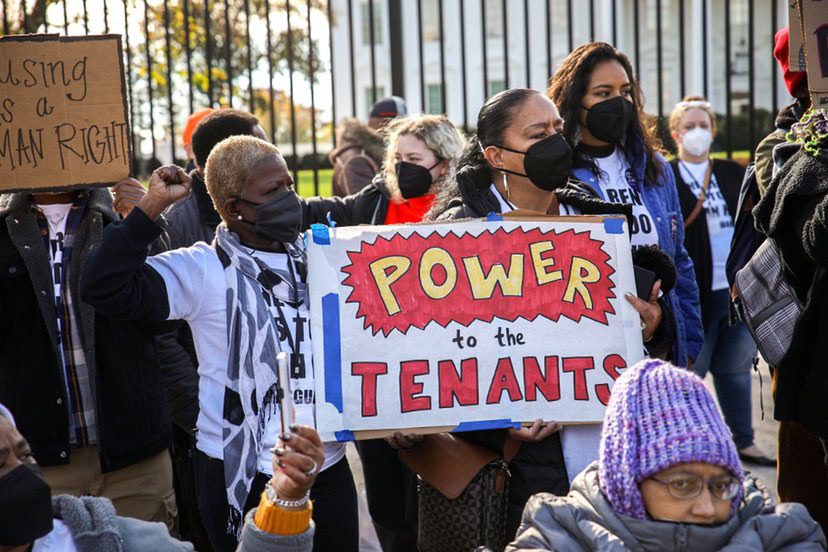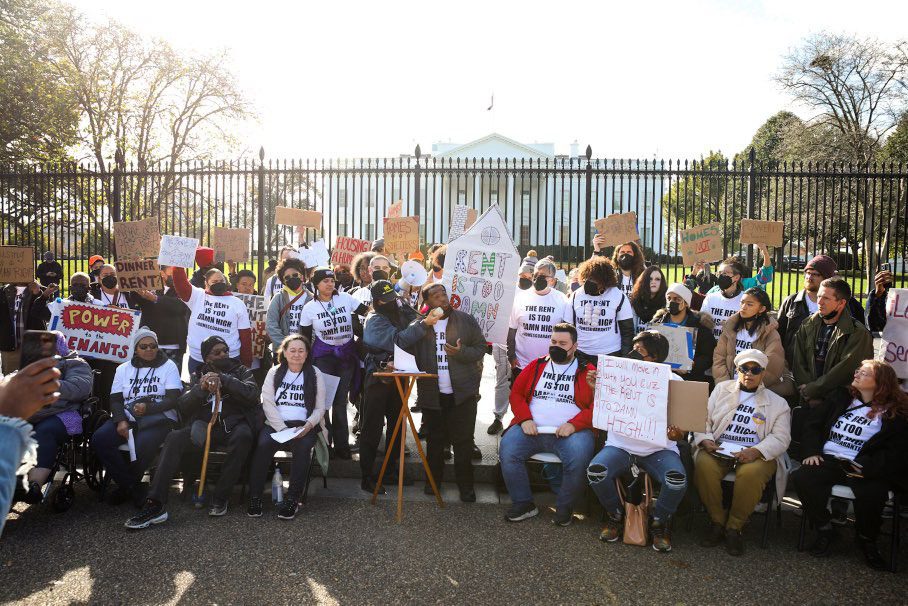
Tenants who have experienced evictions rally at the White House in November 2022, two days after tenant advocates met with White House officials. Photo by Shedrick Pelt, courtesy of People’s Action
Following a November 2022 meeting with top White House officials, tenant advocates say they’re waiting for the Biden administration to announce substantive policy changes to control rents, protect tenants’ rights, regulate private housing providers, and eliminate barriers to housing access.
After months of discussions between advocates and federal officials, President Biden could issue directives in the coming weeks that will concretely address the soaring rents of the past two years, particularly at housing developments that receive federal financing, advocates say.
“I think they’re just looking for the right time to do it. Every indication tells me that they’re pretty close,” says Tara Raghuveer, Homes Guarantee campaign director at People’s Action, an advocacy organization.
The Nov. 14 meeting at the White House brought together more than 70 tenant leaders and advocates, housing providers, legal advocates, and housing policy experts who met with top Biden aides, including Domestic Policy Adviser Susan Rice, National Economic Council Director Brian Deese, and American Rescue Plan Coordinator Gene Sperling.
The officials stressed their commitment to enforcing the Fair Housing Act, preventing discrimination, and advancing fair tenant-screening practices, and discussed ways to institutionalize eviction diversion and ensure due process rights, according to the White House. But they did not commit to fulfilling the demands of the Homes Guarantee campaign and other advocates, such as a rent cap on housing backed by Fannie Mae or Freddie Mac financing.
Two days later a similar group of administration officials met with housing industry groups, who urged them not to impose rent control or rent stabilization measures. Such policies “would have a hugely detrimental effect on rental housing,” National Association of Realtors President Kenny Parcell wrote in a letter to Rice after that meeting.
Parcell argued that limiting rent hikes would force mom and pop housing providers to sell their properties to large corporate housing companies with histories of higher rents, while also harming the economy, depressing property values, and reducing tax revenues.
[RELATED ARTICLE: How Organizers Won a Tenants Bill of Rights in Miami-Dade County]
Raghuveer notes that some industry representatives attended the first meeting along with advocates, but tenants were not invited to the second meeting. The White House should have tenant leaders with on-the-ground experience at all relevant meetings on housing issues, she says.
“I don’t think we should read into it more than is necessary, but it is important to acknowledge that, like on a lot of issues, on this issue it’s often the case that there’s a big kids’ table and everyone else,” she says.
Tenant advocates have met several times with federal officials since November 2021, Raghuveer says. But she argues that the frequent exclusion of tenants from decision-making processes leads to a proliferation of prescriptions for housing shortages that rely too much on the private market, don’t provide deeply affordable housing, and overemphasize supply at the expense of demands like protection from retaliation for organizing.
“Most of the people we’re engaging with in the federal government …. are more inclined to incentivize good behavior rather than regulate bad behavior. They prefer a carrot to a stick. We prefer a stick, especially when we’re talking about private-market actors that are benefiting from public financing or subsidy,” Raghuveer says. “That’s one substantial area where we’ve noticed there some current misalignment and we’re hoping to see some progress moving forward.”

One hundred tenants who have experienced evictions rally at the White House in November 2022. Photo by Shedrick Pelt, courtesy of People’s Action
For example, while the Biden administration recently issued a series of grants for municipalities that make it easier to build affordable housing, the Homes Guarantee coalition has asked Biden to declare a state of emergency on housing and issue an executive order protecting tenants against unreasonable rent hikes, wrongful evictions, denial of lease renewals, and retaliation. They want him to convene an interagency task force to work on long-term reforms and hold a summit on renter protections.
Among their other requests are for the Federal Trade Commission to sue landlords who impose excessive rent increases, the U.S. Department of Housing and Urban Development (HUD) to require jurisdictions to adopt rent controls, and the Securities and Exchange Commission to make publicly owned companies disclose rent increases. They want the Treasury to set rent regulations for Emergency Rental Assistance Program funds and discourage lease non-renewals in Low-Income Housing Tax Credit-funded properties, and the Consumer Financial Protection Bureau (CFPB) to investigate corporate landlords for unfair tenant screening and debt collection practices.
Raghuveer says the November meeting was preceded by extensive discussions among Homes Guarantee tenant leaders. They also met in advance with other advocacy groups to share stories, establish common goals, commit to “have each others’ backs” at the White House event, and promise to follow up with one another afterward, she says.
The National Alliance of HUD Tenants, National Housing Law Project, National Low Income Housing Coalition (NLIHC), the racial-equity focused organization PolicyLink, the manufactured housing industry, and various legal service providers were among the groups represented at the meeting, Raghuveer says.
Eric Sirota, director of housing justice at the Shriver Center on Poverty Law in Chicago, went to the meeting to press for better housing access for people with histories of arrest and convictions. He says HUD is in the process of conducting an internal policy audit, which he wants to see result in changes to the ways housing providers and public housing authorities are allowed to use criminal records in assessing potential tenants.
“HUD has come out with some really important guidance under the Fair Housing Act, limiting the ability of housing providers in general—private market and subsidized—to exclude people based on arrest and conviction histories,” Sirota says. “But there’s still a hope that that will be broadened and even more vigorously enforced.”
He was encouraged that the White House meeting occurred while the HUD internal review is being done, and that the CFPB released a report the next day on sloppy work by tenant screening companies, he says. The CFPB found that errors in tenant background checks and difficulty in correcting mistakes contribute to higher costs and barriers to quality rental housing. Sirota says it appears the administration is prioritizing fair housing issues and enlisting multiple agencies to push for better housing access.
Like Raghuveer, Sirota was glad to see administration officials hearing directly from tenant leaders.
“Something that was especially promising was the opportunity for residents and for people who are directly impacted to really share their experience and expertise. We need more of that,” he says. “That needs to be a routine part of affordable housing policy development in the same way that, or more than, listening to academic experts is.”
The Shriver Center develops its federal housing agenda in part through its Partnership for Just Housing, which includes NLIHC and other advocacy groups such as the Formerly Incarcerated, Convicted People and Families Movement, a network of organizations led by people with histories of involvement with the justice system.
Sirota notes that continuing federal action on housing access issues is important in part because it can inform local reform efforts and lead to a virtuous cycle of policy improvements.
For example, in 2016 HUD published new guidance on the use of criminal records in tenant screening, which led Cook County, Illinois, to pass a Just Housing Amendment to its Human Rights Ordinance. That rule and similar ones around the country limited the look-back period for criminal convictions to the previous three years, which in turn has informed advocacy at the federal level, Sirota says.
Likewise, strong federal rules and the enforcement of tenants’ right to organize and to be protected from retaliation are critical to their ability to engage in advocacy at all levels of government, he says.





Comments